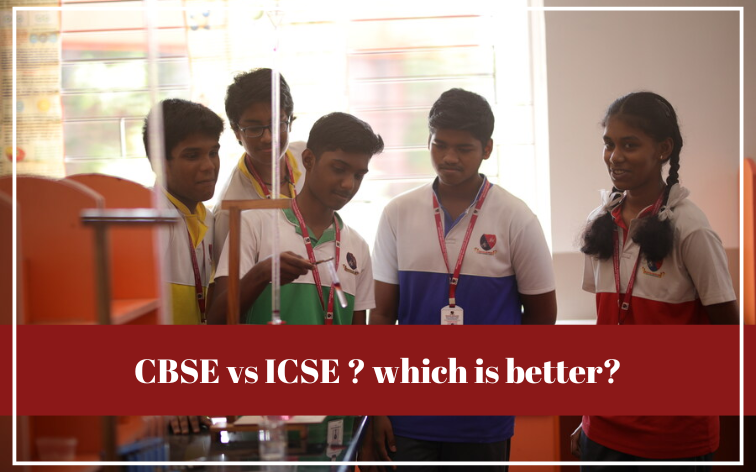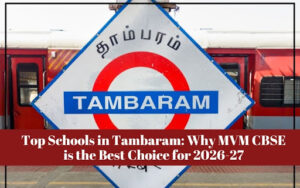Choosing the right educational board for your child is one of the most critical decisions parents face. It shapes their academic foundation, learning approach, and future opportunities. In India, the Central Board of Secondary Education (CBSE) and the Indian Certificate of Secondary Education (ICSE) are the two most prominent educational boards, each with distinct teaching methodologies, curriculum structures, and evaluation patterns. While CBSE is known for its structured, exam-oriented approach that aligns well with national competitive exams like JEE and NEET, ICSE emphasizes comprehensive learning with a focus on language proficiency and analytical thinking. In this article, we have detailed the difference between CBSE and ICSE and elaborated its suitability for different purposes.
CBSE Board – Brief Overview
The Central Board of Secondary Education (CBSE) is a national-level board of education under the Union Government of India, established in 1962. It is the largest educational board in India, governing over 27,000 schools across the country and 240 schools in 28 foreign countries. CBSE follows the National Council of Educational Research and Training (NCERT) curriculum, which provides a uniform, structured syllabus designed to prepare students for national-level competitive examinations such as JEE Main, NEET, and various civil service exams. The board emphasizes science and mathematics, offering a systematic and progressive learning approach that builds concepts incrementally from primary to secondary levels. CBSE’s examination pattern is relatively straightforward, focusing on theoretical knowledge and conceptual understanding with standardized question formats.
ICSE Board – Brief Overview
The Indian Certificate of Secondary Education (ICSE) is a private, non-governmental board of school education in India, established in 1958 by the Council for the Indian School Certificate Examinations (CISCE). The board is renowned for its comprehensive and detailed curriculum that emphasizes balanced education across all subjects, including languages, sciences, humanities, arts, and technical subjects. ICSE places significant importance on English language proficiency, requiring students to master both English Language and English Literature as compulsory subjects, which develops strong communication and analytical skills. The curriculum is designed to encourage in-depth understanding rather than rote learning, with extensive syllabi that cover topics thoroughly and promote critical thinking and practical application.
Difference Between CBSE and ICSE Boards
Below, we have talked about the different aspects to highlight the differences between CBSE and ICSE boards:
Curriculum Structure and Subject Focus
CBSE follows the NCERT curriculum, which is more focused and streamlined, emphasizing science and mathematics with a structured approach that systematically builds concepts from basic to advanced levels. The syllabus is designed keeping competitive exams like JEE and NEET in mind, making transitions to these examinations smoother for students. In contrast, ICSE offers a broader, more detailed curriculum that gives equal importance to all subjects including languages, arts, humanities, sciences, and practical subjects. ICSE requires students to study a wider range of subjects with more in-depth content, including compulsory English Literature, which develops comprehensive knowledge but requires more extensive preparation time.
Language and Communication Skills
CBSE offers flexibility in language choices, allowing students to study in either English or Hindi as the primary medium, with regional languages available as additional subjects in many schools. The focus on language is moderate, with English being one subject among many. ICSE, however, places exceptional emphasis on English language proficiency, making both English Language and English Literature compulsory subjects with rigorous standards. This focus develops superior communication skills, vocabulary, and language comprehension, making ICSE students generally more articulate and proficient in English compared to their CBSE counterparts.
Examination Pattern and Difficulty Level
CBSE examinations follow a relatively standardized pattern with questions that are direct, objective-focused, and primarily test conceptual understanding and theoretical knowledge. The question papers typically include multiple-choice questions, short answers, and long answers with predictable formats, making preparation more systematic. ICSE examinations are considered more challenging and analytical, featuring questions that require in-depth understanding, application of concepts, critical thinking, and descriptive answers. ICSE questions often test students’ ability to analyze, interpret, and apply knowledge in practical scenarios rather than simply recalling facts, demanding higher-order thinking skills.
Practical and Application-Based Learning
CBSE includes practical work and internal assessments, particularly in science subjects, but the emphasis remains primarily on theoretical knowledge and exam performance. The board has introduced project-based learning and skill subjects, but these constitute a smaller portion of overall evaluation. ICSE places significant emphasis on practical knowledge, project work, internal assessments, and hands-on learning experiences across subjects. Students are regularly evaluated on laboratory work, projects, assignments, and practical applications, which constitute a substantial portion of their final grades, encouraging experiential learning and real-world application of theoretical concepts.
Recognition and Competitive Exam Preparation
CBSE is widely recognized across India and has significant acceptance for higher education admissions, particularly for engineering and medical entrance examinations. The CBSE syllabus closely aligns with the syllabi of JEE Main, NEET, and other national competitive exams, giving CBSE students a natural advantage as they don’t need to learn additional topics beyond their school curriculum. ICSE is equally recognized by universities in India and abroad, with particularly strong acceptance in international institutions due to its comprehensive curriculum. However, ICSE students preparing for competitive exams like JEE or NEET often need to invest additional effort in exam-specific coaching since the ICSE syllabus, while thorough, includes broader content that may not directly align with competitive exam patterns.
CBSE vs ICSE – Summary Table
Aspect | CBSE | ICSE |
Curriculum | NCERT-based, focused and streamlined, emphasis on Science and Mathematics | Comprehensive and detailed, balanced across all subjects including Arts and Languages |
Examination Pattern | Standardized, direct questions, theory-focused | Analytical, application-based, requires descriptive answers |
Practical Work | Included but secondary to theory | Significant emphasis with substantial weightage |
Competitive Exam Alignment | Highly aligned with JEE, NEET, and other national exams | Broader curriculum, may require additional coaching for competitive exams |
Best Suited For | Students targeting engineering/medical careers and well-round education | Students seeking comprehensive education, strong language skills, international outlook |
Which is the Best CBSE School in Chennai?
If your child has a scientific or technical mindset and you wish to provide a well-rounded education, then CBSE is the right choice. Once you’ve decided on the CBSE curriculum, the next step is choosing the right school, and that’s where Mahalakshmi Vidya Mandir stands out. As one of the top CBSE schools in Chennai, we prioritize delivering quality education through effective teaching methods and a comprehensive curriculum. With advanced infrastructure, including smart classrooms, and a strong focus on holistic development and academic excellence, we ensure that every student receives the guidance and opportunities needed to excel. Our goal is to cultivate well-rounded individuals who thrive in every aspect of life.




